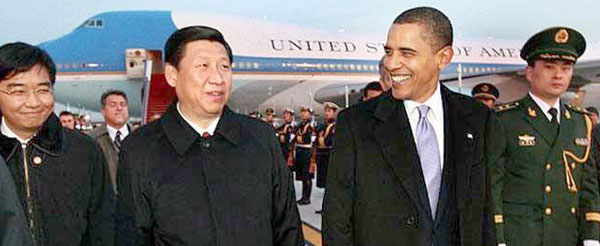Xi Jinping’s revisit with Barack Obama in California on June 27th merits a brief review of Xi’s last visit and the challenges both face to forge stronger and healthier Sino-US relations
Xi made clear that China wants a deeper relationship with the U.S. and even welcomed its engagement in the Asia-Pacific region, as long as it respects China’s interests and concerns. “A prosperous and stable China will not be a threat to any country,” Xi said. “It will only be a positive force for world peace and development.”
Xi said that the two nations must respect each other’s “core interests” while working to build trust and cooperation on a variety of issues, including trade policies and diplomacy with North Korea and Iran. Xi’s use of the term “core interests” was intended to emphasize the existence of a line that the U.S. and other countries not cross in discussions with China. In particular, “core interests” has come to mean territorial sovereignty, and Xi stressed that the U.S. should oppose those advocating independence in Taiwan and Tibet.
To drive home the point that the U.S. isn’t doing enough to respect such “core interests,” Xi borrowed a line from George Washington that “actions, not words, are the true criterion of the attachment of friends.”
Xi did not mention the trade deficit between the two countries.
U.S.-China trade is expected to top $500 billion soon, and the countries have moved from “mutual estrangement to a close exchange with increasingly intertwined interests,” he said.
China has been America’s fastest-growing export market, according to Kenneth Lieberthal, director of the John L. Thornton China Center at the Brookings Institution.
What a difference a year can make in Sino-U.S. relations. Hopefully there will be more positive changes in the years to come. That is what the citizens of both America and China want, according to two surveys commissioned at the end of 2011 by China Daily with Gallup in Washington and Horizon Research Group in Beijing.
The China Daily-Gallup survey covered 2,007 members of the general public and 250 opinion leaders in the U.S. Seven in 10 U.S. respondents said strong relations between the U.S. and China are “somewhat” or “very” important. Opinion leaders were even more emphatic, as 85 percent said strong relations between the two countries are important.
Similar results were found in the China Daily-Horizon survey, which polled residents from Beijing, Shanghai, Guangzhou, Wuhan, Chengdu, Shenyang and Xi’an, most of which host U.S diplomatic offices. More than 90 percent of the Chinese public, regardless of their location, have believed for many years that the Sino-U.S. relationship is important, according to the survey.
Xi is a leader America can work with. Before embarking on his U.S. visit, Xi remarked that “our commitment to the development of the Sino-U.S. cooperative partnership should never waiver in the face of passing developments.”
Xi has set the right tone for future U.S.-Sino relations. A long overdue conciliatory tone the world’s two most powerful countries need to adhere to as they forge ahead through the rough turbulent sea of their rocky relationship.
Xi’s last visit to America came just a week before the 40th anniversary of President Richard Nixon’s historic 1972 visit to China. On February 21, 1972, the day of Nixon’s arrival in Beijing, the U.S. president said: “There is no reason for us to be enemies. … This is the day for our two peoples to rise to the heights of greatness which can build a new and better world.”
Recalling Nixon’s visit in a ceremony in Beijing, Xi pledged China’s unwavering “commitment to developing the Sino-U.S. cooperative partnership.”
There is no reason for the two equally confident civilizations to be enemies. As the spirit of 1972 echoes, new generations of American and Chinese leaders ought to demonstrate the same wisdom and courage that Nixon displayed so that the two countries can continue working together to build a New World Order for the next 40 years and beyond.
The much-needed answer is detailed in my Custom Maid trilogy for America’s Third Revolution and was echoed by Le Yucheng, China’s assistant foreign minister, at an economic forum in Beijing in April 2012. “Like it or not … I believe our two countries have the responsibility, ability and wisdom to forge a new type of relationship between major countries, marked by sound interaction and win-win cooperation.”
“In this networked world of myriad challenges, win-win cooperation is not a choice but the choice,” Le said, stressing that this is precisely the “new answer” Washington is seeking in its attempts to reconcile with China’s rise.
With slow job growth at home and worries of a hard landing by the Chinese economy in an already hard-hit global economy, analysts, myself included, are questioning and challenging whether Washington is able or capable of continuing to improve the state of the world economy alone. While some observers believe the rising powers pose a challenge to, and may ultimately help end Western supremacy, Le said that the “zero-sum game” mentality must change in an increasingly interconnected world. They must, and hopefully they will after the upcoming redux.

